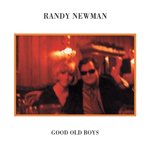The more recognized Randy Newman is in mainstream culture, the more reviled his presence becomes. Despite enduring critical popularity with Pixar, his songs for their films -- think “You’ve Got A Friend In Me” from Toy Story or “If I Didn’t Have You” from Monsters, Inc. -- have made his name synonymous with mediocrity. They’re fine songs, but regular Oscars viewers turn hostile seeing this potato-shaped old man on the red carpet every year. (Though I’d like to make a case for the beautiful “When She Loved Me” from Toy Story 2. Maybe that’s a separate column.)
It wasn’t always so. Newman’s records, including this year’s decent Harps and Angels, are elegant character portraits and sharp satirical documents. As a writer, Newman ranks with Mark Twain as one of the country’s finest and funniest social critics; as a musician and composer, he stands with McCartney and Lennon, and the best of Tin Pan Alley.
Sail Away, released in 1972, is often cited as the pinnacle of Newman’s satirical work. And while it’s a great record, Good Old Boys is the subtler, more complicated effort. In fact, satire doesn’t get more complex than opening track “Rednecks,” whose hick narrator sees Georgia governor Lester Maddox on the Dick Cavett Show and spits out a rant about the patronizing response the politician receives from the northern-elite audience. The result is Newman singing from the southerners point of view, himself singing about the northern hypocrites who mock his kind: “We don’t know our ass from a hole in the ground/ We’re rednecks, and we’re keeping the niggers down.” This is followed by a critique of segregation: “[The black man is] free to be put in a cage in Harlem in New York City/ He’s free to be put in a cage on the south side of Chicago.” That’s just the first track.
Things get a little less complex from there, but no less vivid. The narrator of “Birmingham” is a proud Alabama resident who works in a factory (“that’s all right with me”) and owns Dan, "the meanest dog in Alabam." He is also married to the title character of “Marie,” one of Newman’s finest compositions. The heartbreaking ballad is sung by Marie’s drunk husband, who tells his wife the things he’d never say sober: “The song that the trees sing when the wind blows/ You’re a flower, you’re a river, you’re a rainbow.” (He won’t remember this in the morning.)
Good Old Boys' centerpiece is “Louisiana 1927,” an account of the Great Mississippi Flood. The song’s refrain is “they’re trying to wash us away,” a comment on the theory that the city’s levees were dynamited to preserve the wealthier sections of New Orleans. Unsurprisingly, the song gained new popularity in 2005, after similar theories arose from Hurricane Katrina. It's simply a gorgeous track, accomplishing in a few words what lesser social critics attempt with entire books. And, like the rest of the record, the song just sounds great. There's just enough orchestration to inject some theatricality, but Newman's tight band -- which included session veterans Jim Keltner on drums, bassist Russ Titelman, and Glenn Frey and Don Henley as guest vocalists -- provide its R&B backbone.
At the time of Good Old Boys' release, some criticized Newman for patronizing his southern subjects. However, though these narrators are seemingly inarticulate, they’re simply direct: “they’re trying to wash us away”, “he’s free to be put in a cage.” These aren’t idiots, and in using the vernacular of a hick stereotype, Newman has pulled off a bait and switch, a record of misdirection. If you think this is a crude caricature, you can almost hear him saying that you’re the one recognizing the stereotypes, so you’re the crude one. See what I mean? Complicated.
